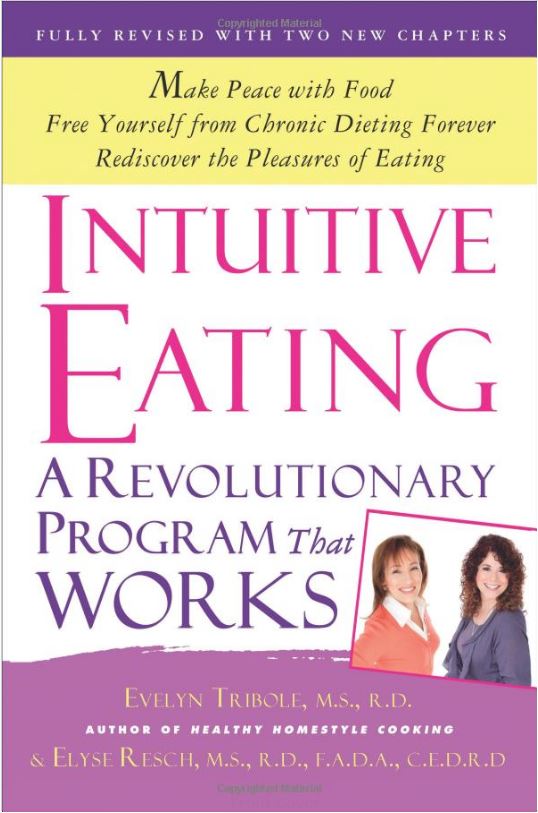Have you heard of Intuitive Eating?
Intuitive Eating (IE) is a nutritional philosophy I love, but it’s very often misunderstood.

Isn’t IE just “eat whatever you want, feel great, and be healthy”?
Well that’s the elevator speech for someone just coming in. But as with any life-changing program, there is much more depth and the client should be guided to move past that initial idea into something more substantial.
We are finding more food intolerances now and there are many reasons for this. Someone could have a food intolerance because there is a genetic component that causes them to react to a certain food. Or because of a pesticide or other chemical on that food.
Or a person could react to the cooking method, a different ingredient entirely than expected, because of an imbalance in the microbiome, or because of psychological association. In any of these cases, a further look is warranted. If the person has a true allergy or intolerance to a food, such as how I personally react to mango, they can be counseled on ways to safely eliminate that food while still enjoying their overall daily nutrition intake. But if it’s any of the other reasons, it’s important to get at the root cause and figure out what’s going on behind the scenes. Humans have been around for a long time. If it was normal for someone to react poorly to 100 different foods, we probably wouldn’t exist. So further research is needed.
But when it’s a single food, and it’s truly a 100% physical reaction, that food should be eliminated.
And this idea is 100% within the IE structure.
IE is the search for health in places other than the scale. But that means that there are, in fact, other metrics of nutritional success, both objective and subjective. Some complain of feeling ill and bloated or puffy when implementing dietary changes. These people are not experiencing health. They are uncomfortable. A well-seasoned (pun intended) professional will be able to guide them past that stage to a place where they enjoy their food with no psychological stress and no physical discomfort.

A realistic situation.
Joy has a pancake breakfast. Big pancake breakfast. Here are the possible outcomes:
a) Joy feels guilty that she ate all of that because it impact the number on the scale in an unfavorable direction. She covers her guilt with ice cream or cookies.
b) Joy enjoyed the pancakes and feels fine.
The whole Intuitive Eating vs diet culture argument would have you believe that this is where the scenario ends
but stick with me here.
c) Joy feels ill/fatigued and says, “maybe next time I’ll stick to 1-2 pancakes and round the rest of the meal off with other foods.”
d) Joy feels ill/fatigued and swears off gluten (which may or may not be related at all)
e) Joy feels ill/fatigued but had such a great time with friends and family at this breakfast that she won’t worry about it, but will try to plan for a nap later in the day.
f) Joy feels ill/fatigued, realizes that she has been feeling this way a lot lately and says, “I’m going to explore this with an appropriate professional“.
When someone is focused on the scale,
they aren’t paying attention to the taste or the experience, choosing the stress of restriction instead. And we know that stress is inflammatory on it’s own. This person loses touch with her body signals, but not just with hunger and satiety. She loses the ability to recognize when a meal or a nutrition pattern causes discomfort. She doesn’t make the link between too much caffeine and poor sleep. She doesn’t recognize how her body reacts to different foods/meals/patterns as far as mood, quality of sleep, interpersonal relationships, and an overall sense of well-being.
Her blood values come back and there are inflammatory markers, such as elevated A1c or CRP. Her blood pressure is elevated – but how can that be? She has been actively pursuing weight loss, so she should be in a healthy state. Right?

But the psychology of dieting/restriction, and placing too much energy on analyzing every bite puts all of her body signals on mute.
In a perfect world, Joy would eat something in a joyful way, experiencing the flavors and atmosphere, and then be able to understand how that affected her body by merely listening. That takes work. IE is a process and it takes a long time to truly internalize that no foods are forbidden (other than those that truly cause illness to that individual).

Intuitive Eating isn’t all “feel good and love your body”, but has a potent “listen to your body to achieve true health” message. It’s not “eat what you want whenever you want it”, but instead, “your body knows best”.
Quiet your mind to turn up the volume on your biology.
